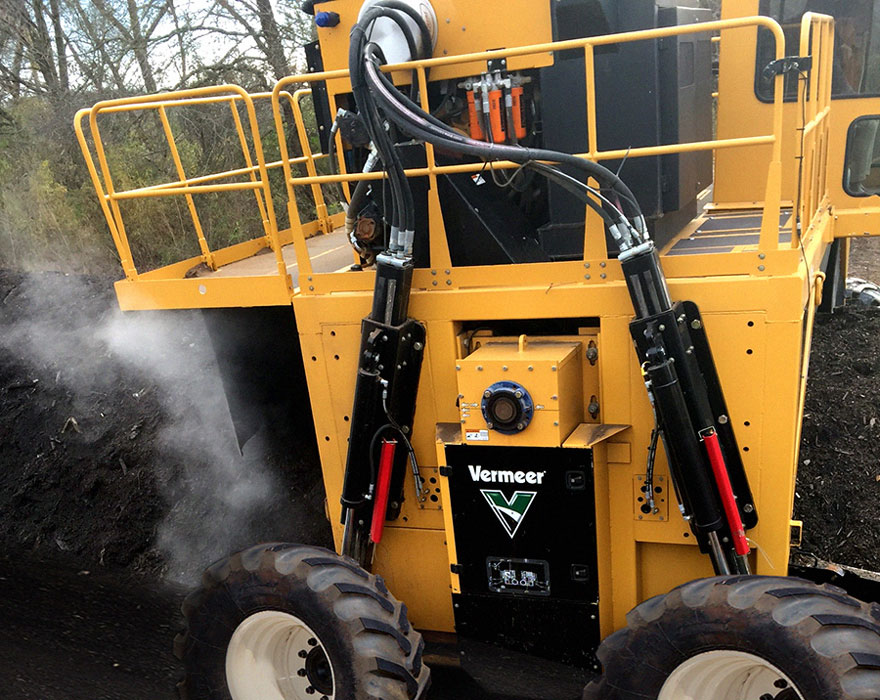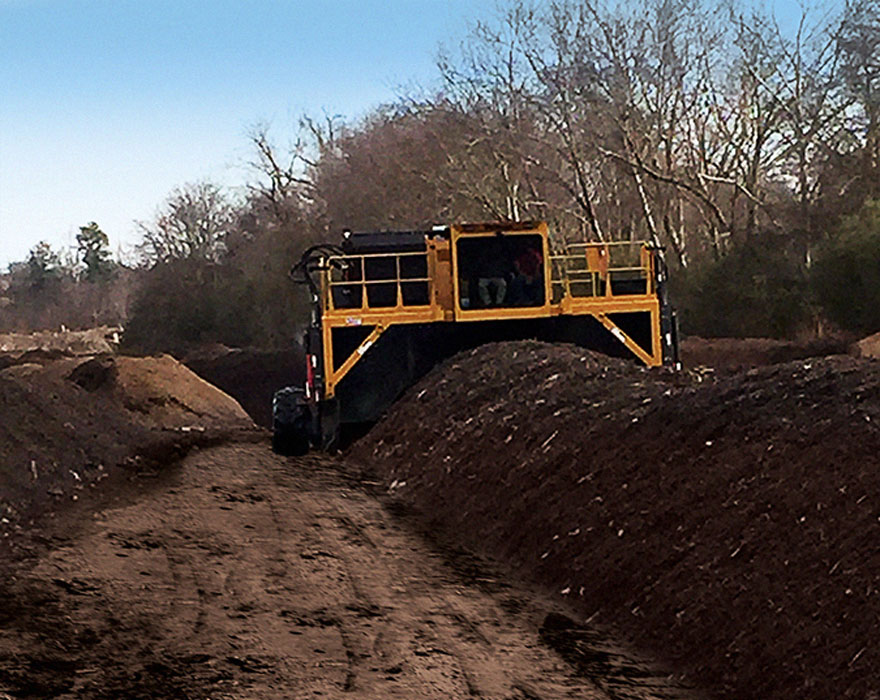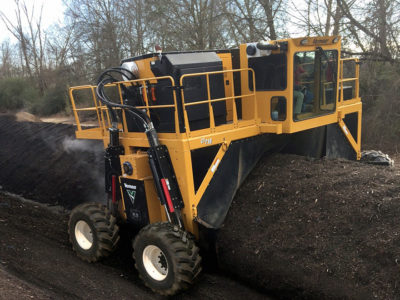“Our growth since the beginning can be summed up pretty easily — we’ve gone where our customers have needed us to go,” explains Chris Cowart, owner of Cowart Inc., a large provider of high-quality composts, mulches and provider of tree care services for the Southeast region of the United States.
Keeping up with customer demand has grown Cowart Inc. from a small tree care service provider into business sectors Chris knew little about when he opened his doors in 1987. Finding a better solution to use all the wood chips his crews were creating led Chris to add mulch products to the company’s offerings in the late 1990s. Cowart Tree Experts then became better known as Cowart Mulch Products, Inc. — a familiar name seen on bag mulch in many retail stores, and a name that can be seen on the side of trucks traveling around the region.
Seeing significant opportunity for growth, Chris expanded the company’s services into composting three years ago, and today, Cowart operates a fleet of more than 900 machines, has seven locations and employs more than 100 people.
Getting into composting
“We got started in the composting industry by offering different soil blends to our customers along with our mulch products,” explains Chris. “Being able to say ‘yes’ when a customer asks us if we have a certain product or mixture is what has propelled us to where we are today; so, we weren’t about to say ‘no’ when several of our large customers began asking us for different blends than what we were currently offering. And, we never do anything partway. We scaled up our operators and committed ourselves to providing the highest quality of material available.”
The territory where Cowart was already collecting waste material provided the company with an abundance of material for its operations. Its Tennessee, Florida and five Georgia locations all take in raw material from public and private sources. Each location is armed with the equipment needed to process the material, but only its facility in Athens, Georgia. is used for composting.
Cowart’s composting location also takes in a large volume of food waste from independent sources that work with area restaurants and grocery locations. “All of the food waste we receive comes in unprocessed,” Chris says. “We handle all of the processing for that material at our facility before it gets added to the rest of our compost piles. As we focus efforts to separate food waste from other waste increases, I’m sure we’ll continue to see more growth in this area for our business, and we’ll adjust our operation to accommodate for it.”

Composting equipment
There is a lot that goes into getting started in the composting business. Chris says while his equipment fleet was sizable before they officially entered the market, there were several additions made to help them become more efficient and create a better product. “We use tub grinders, horizontal grinders, trommel screens, conveyors and wheel loaders in other parts of our business so we had the bulk of the equipment we needed already,” he explains. “However, after using wheel loaders for a while to turn compost, we determined we would need to add a compost turner to our fleet to improve our overall efficiencies. We wanted to go from doing it one way to doing it the right way.”
After evaluating several options, the company went with a Vermeer CT718 compost turner that can turn windrows up to 18 feet (5.5 m) wide. Cowart’s unit also features a control display with a full instrument panel and a view to the rear and side of the unit through machine-mounted cameras. “It’s a heck of a lot more efficient than the way we used to do things,” Chris says.
“In addition to being impressed with the quality of the CT718, we chose the Vermeer model because of the support our local dealer has provided since we started working with them back in the 80s,” adds Chris. “Also, Vermeer offers a complete line of composting equipment, and anytime we’ve had a question about the market or equipment, they have always been helpful.”
Since making the switch to the Vermeer compost turner, Chris says they have seen a difference in the quality of their product. “We know everything is getting turned over properly, which leads to an increase in oxygen levels and the result is a much higher-end product,” he explains.
In addition to the CT718 compost turner, Cowart operates three Vermeer tub grinders, a pair of Vermeer horizontal grinders, a Vermeer trommel screen and a Vermeer mini skid steer, which Chris says comes in handy around the facility.
When asked about the company’s mix of tub and horizontal grinders, Chris says their preference is to use tub grinders wherever possible. However, the area of some of their facilities requires them to use horizontal grinders instead. “Tub grinders do a very efficient job of processing material, which means we can get through a lot of material quickly,” he adds. “When space around the grinder is limited, we go with a horizontal grinder because there is less thrown material surrounding the operation.”
Cowart uses trommel screens to separate the compost into three different main blends. Those blends are then bagged and distributed through retailers. For Cowart’s bulk customers, they will customize their mix ratio and currently produce around 400 different blends. “Most of our customers know exactly what they want, and we blend it accordingly,” Chris stated.

State of the industry
“The composting market is growing throughout the United States, and right now, supply isn’t keeping up with demand, so there are a lot of opportunities for companies like ours. However, I believe compost companies need to stay attentive to the quality of the compost they are selling; otherwise the entire industry could suffer a setback.”
“The industry has to be able to show customers all of the advantages of using compost for their topsoil and planting needs, or they will revert to other options,” elaborates Chris.
Looking ahead
Chris attributes Cowart’s success to great employees, the right equipment and hard work. “We’ve never been a company afraid of investing,” he explains. “To provide quality end products for our customers, we have to hire quality people and operate quality equipment. We get out what we put in.”
Cowart will continue to expand its operations to other areas of the country as opportunities come up. “There is so much opportunity in this industry right now, and as our customers need change and growth. We’ll make sure we’re ready to deliver on all of it,” Chris concludes.
This article contains third-party observations, advice or experiences that do not necessarily reflect the opinions of Vermeer Corporation, its affiliates or its dealers. Testimonials and/or endorsements by contractors in specific circumstances may not be representative of normal circumstances experienced by all customers.
Vermeer and the Vermeer logo are trademarks of Vermeer Manufacturing Company in the U.S. and/or other countries.
© 2017 Vermeer Corporation. All Rights Reserved.
